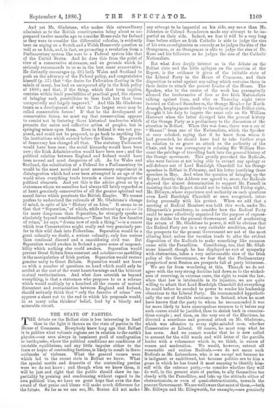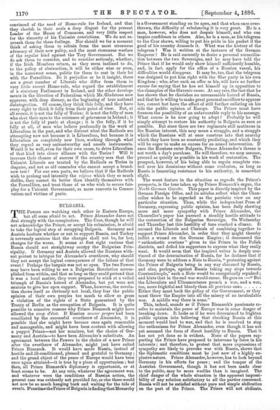THE STATE OF PARTIES. any attempt to be impartial on
his side, any more than Mr. Johnston or Colonel Saunderson made any attempt to be im- partial on their side. Indeed, we fear it will be a very long time before either an Irish Catholic is able to judge the sins of his own co-religionists as severely as he judges the sins of the Orangemen, or an Orangeman is able to judge the sins of Dr. Kane and his followers as he judges the sins of the Catholic Nationalists.
We are far from wondering at this. Though we do not . agree with the very strong doctrine laid down as to the wicked- ness of reserving, in extreme cases, the right to resist the law, when that law is intolerable in its injustice, we are quite willing to admit that Lord Randolph Churchill did everything he could before he acceded to power to render his leadership obnoxious to the Liberal Party. He recommended hypotheti- cally the use of forcible resistance in Ireland, when he must have known that the party to whom he recommended it was far more likely to have unscrupulous recourse to it before any such course could be justified, than to shrink back in conscien- tious scruple ; and then, on the very eve of the Elections, he directed a scurrilous and personal attack on Mr. Gladstone, which was offensive to every right-minded man, whether Conservative or Liberal. Of course, he must reap what he has sown. And we cannot wonder that he is now called. to account for the wild words and wild letter of the guerilla leader with a vehemence which is, we think, in excess of reason and moderation. We would, however, entreat all reasonable and serious Radicals,—we do not mean such Radicals as Mr. Labouchere, who is an enrage not because he is indignant or embittered, but because politics are to him a game in which he has found it most amusing to identify him- self with the extreme party,—to consider whether they will do well, in the present state of parties, to ally themselves too closely with the Parnellites, and take up the attitude either of obstructionists, or even of quasi-obstructionists, towards the present Government. We are well aware that most of them,—both Mr. Dillwyn and Mr. Illingworth, for example,—are genuinely convinced of the need of Home-rule for Ireland, and that they cherish in their souls a deep disgust for the present Leader of the House of Commons, and very little respect for the sincerity of his Unionist convictions. We do not re- proach them for these feelings. Nor should we for a moment think of asking them to refrain from the most strenuous advocacy of their new policy, and the most strenuous warfare of the regular kind against the Tory Government. But we do ask them to consider, and to consider seriously, whether, if the Irish Members return, as they seem inclined to do, to the policy of obstruction, it will be either wise or even, in the narrowest sense, politic for them to cast in their lot with the Parnellites. Be it prejudice or be it insight, there are a great number of Liberals who differ from them in very little except Home-rule, who regard the establishment of a statutory Parliament in Ireland, and the other develop- ments in the direction of Federalism which Mr. Gladstone now approves, with deep dismay, as the beginning of true national disintegration. Of course, they think this folly, and they have every right to think it folly from their point of view. But, at all events, it is not the folly of Tories; it is not the folly of men who shut their eyes to the existence of grievances in Ireland ; it is not the folly of panic at change ; it is the folly, if it be folly at all, of men who believe profoundly in the work of Liberalism in the past, and who distrust what the Radicals are attempting now not because it is Liberalism, but because it is Liberalism on completely new lines, working through what they regard as very untrustworthy and unsafe instruments. Would it be well, even for their own cause, to drive Liberalism of that kind into closer alliance with the Tories ? Will it increase their chance of success if the country sees that the Unionist Liberals are treated by the Radicals as Tories in disguise, and not as old comrades who cannot accept a brand- new test? For our own parts, we believe that if the Radicals wish to prolong and intensify the re'gime which they so much dislike, they cannot do better than identify themselves with the Parnellites, and treat those of us who wish to secure fair- play for a Unionist Government, as mere converts to Conser- vatism and victims of panic.



































 Previous page
Previous page